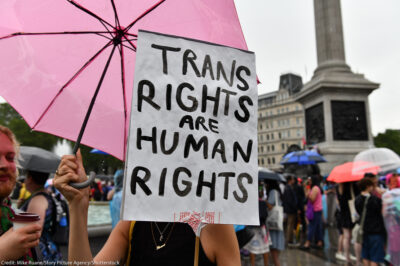
Last night, by 234 – 194, the House of Representatives passed an amendment to the Defense Authorization Bill that paves the way to end the ban on gay and lesbian servicemembers. The Senate Armed Services Committee also passed a similar amendment Thursday afternoon. The Defense Authorization Bill is now up for a full vote this afternoon in the House, and a vote in the Senate is likely in early June. Here’s why it is so important for Congress to get rid of Don’t Ask, Don’t Tell once and for all.
First, let’s get clear about what “Don’t Ask, Don’t Tell” actually does. The country seems to have increasingly bought into a great scam: that DADT says that you can’t serve in the military if you are openly gay. It does say that. But it also says that you can’t serve unless you are celibate, even if you are not out, a requirement imposed on no one else in the military.
It’s important to get rid of DADT for at least three reasons. First, we need to get rid of it because of the damage it does to so many decent Americans who volunteer to serve. DADT is particularly cruel because many of them only realize they are gay after they’ve joined.
Second, we need to get rid of DADT because it is a blot on the Constitution. DADT enshrines in federal law a principle which had been rejected in most other contexts: that discrimination could be justified by the prejudice of others. In the 60s, businesses in the South said that the prejudice their customers had against black people ought to give them an exemption from discrimination laws. Congress and the courts disagreed. In the 80s, government agencies actually defended discrimination on the basis that neighbors (or others) had strong negative feelings about disabled people, “hippies” and even older people (in Miami of all places). Again, the courts disagreed. But in the Congress that passed it, the single justification for Don’t Ask, Don’t Tell was not that gay members of the Armed Forces couldn’t do their jobs. It was rather that heterosexual service members would be so unnerved by the mere presence of gay people that they would be unable to perform theirs. As long as DADT endures, the idea that your rights can’t be taken away just because someone else doesn’t like you is hardly secure.
Third, our work to build real equality in the law and in the hearts of Americans won’t succeed as long as the federal government has a law on its books that says discrimination is ok, at least some of the time. Laws like that are the most profound statement that a group doesn’t deserve equality, especially because Americans believe (not entirely correctly) that the federal government has been an engine for ensuring fairness and equality. Getting rid of DADT won’t be enough; there’s another little law called the “Defense of Marriage Act” (and you thought Congress has no sense of irony) that will have to go as well.
Finally, as we take down DADT, we should remember a bit of its history. DADT was the result of trying to use an institution (in this case, the President) to change the law before the political work needed to sustain the change had been done. DADT didn’t represent a failure to make change; it made things significantly worse. Let’s hope it’s a lesson we don’t have to learn a second time.




